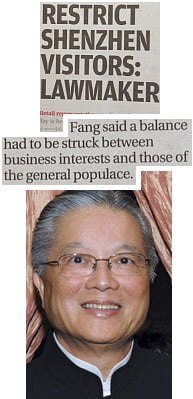Already mentioned this on the Tweet thing, but…
Hong Kong Legislative Council member Vincent Fang states, in essence, that he sees the interests of ‘business’ and those of ‘the general populace’ as incompatible. He must also believe that these two separate and conflicting entities are of broadly equal importance to [something more important than either, can’t think what] as he concludes that [someone or  something] should strike a balance between these differing interests.
something] should strike a balance between these differing interests.
In Victorian Britain, mine-owners employed eight-year-old boys to pull coal through the tunnels mules couldn’t squeeze into. More recently, energy companies have literally stripped and cut the top off rows of mountains in West Virginia, turning rolling forest into flood-prone, polluted moonscape. In northern China, filthy power stations cover whole cities in a permanent layer of grey soot and reduce residents’ life expectancy. It is perfectly possible for the interests of ‘business’ to conflict with those of society as a whole (coal apparently has a particularly tough time).
But, mostly, modern capitalist democracies are beyond that. Pollution, exploitation, rogue financing and other corporate abuses hit the headlines, but in the background, 99% of companies make profits by meeting social needs (loosely defined), and create jobs and pay taxes. You don’t hear Bill Gates or Warren Buffett or Richard Branson whine about striking a balance between the interests of ‘business’ and ‘the general populace’.
The only reason a businessman should see the ‘general populace’ as distinct from himself – even some sort of threat – is if his enterprise is parasitical, extracting net wealth rather than creating it. In Hong Kong, where much domestic commerce is cartelized, those who most leech off the productive economic sectors are considered the pinnacle of the ‘business community’. That largely means the property tycoons. It also means second-generation Shanghainese who inherited textiles fortunes accumulated in the 50s and 60s under a licence-to-print-money regime of tradable export permits. Vincent Fang is one example (along with Henry Tang and James/Michael Tien and the rest of the greater Liberal Party).
Fang’s proposal to counter Hong Kong people’s reaction to being swamped by Mainland shoppers is to curb Shenzhen residents who spend all day going backwards and forwards smuggling milk powder, Yakult, diapers and (the latest inexplicable fad) Lay’s potato chips. This would, in theory, reduce the influx into Sheung Shui and Fanling, to the detriment of small retailers and landlords who are, to Vincent Fang, probably just part of the ‘general populace’ anyway. Meanwhile, other Mainland shoppers would continue to converge on Kowloon and Hong Kong Island to buy their designer-label tat from the big international chains hosted by the big landlords (property tycoons and other members of Fang’s ‘business’ caste).
It probably wouldn’t work: the arbitrage opportunities would attract more retirees and other people from the Hong Kong side to crisscross the border all day with boxes of toothpaste. Still, the New Territories towns do host tycoon-owned malls and retailers, so this suggestion represents a degree of sacrifice on the part of our noble ‘business’ community vis-à-vis the wretched ‘general populace’.
The inability to identify ‘economy’ as ‘society’ seems widespread in this increasingly demented city. Commerce Secretary Greg So talked a while back – apparently seriously – about ‘balancing economic development with the livelihood of the people’. Yes, the population are a hindrance to their own territory’s material well-being. And the South China Morning Post reports without question a ridiculous coded threat from a Chinese government propaganda ‘academy’ that if tycoon Li Ka-shing ‘reduces his investments in Hong Kong’ it will damage our competitiveness. ‘Reducing his investment’ means selling bits of cartels to other investors, which points towards diversified ownership, which suggests a possibility of more competition. Which, in SCMP-land, reduces competitiveness. If it were just one government minister and just one newspaper becoming unhinged, you could sort of shrug it off, but it seems everyone’s lost their faculties on this basic issue of what an economy is. (For a glorious breath of sanity, read the SCMP readers’ comments.)
This is almost the tycoons’ last card in the struggle between the Hong Kong ‘general populace’ that bears the significant costs of Mainland shoppers and the landlords/retailers who benefit so much from them. If this fails, there will be only one thing for it: resettle Hong Kong residents overseas to create space for the overridingly important ‘tourists’.

